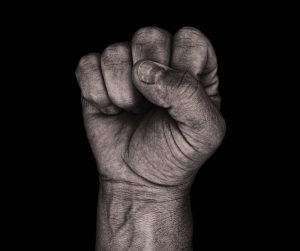
The Black Panther Party (BPP), opens a new window was a revolutionary socialist organization founded in Oakland, California, in 1966 by Huey Newton and Bobby Seale. Initially established as the Black Panther Party for Self-Defense, its primary goal was to address police brutality and protect African American communities. The party gained national attention for its 10-Point Program, opens a new window which advocated for armed self-defense, community patrols and the promotion of Black empowerment. The BPP also implemented social programs, such as free breakfast programs for children and health clinics, contributing to their broader vision of social justice. However, the party faced intense scrutiny and government repression, which eventually led to its decline in the early 1970s. Despite its relatively short existence, the Black Panther Party had a lasting impact on the fight for civil rights and the struggle against systemic racism in the United States.
What is Black Power?
 "Black Power" is a political slogan and movement that emerged in the 1960s in the United States, primarily within the context of the civil rights and Black liberation movements. Coined by activist Stokely Carmichael in 1966, the term became a rallying cry for African Americans seeking autonomy, self-determination and empowerment. Black Power emphasized the importance of economic, social and political independence for the Black community, advocating for a rejection of systemic oppression and racism. It encouraged pride in Black identity, culture and heritage, promoting the idea that African Americans should define and control their own destinies. The movement influenced various aspects of society, including the arts, politics and grassroots organizing, leaving a lasting impact on the ongoing struggle for racial equality in the United States.
"Black Power" is a political slogan and movement that emerged in the 1960s in the United States, primarily within the context of the civil rights and Black liberation movements. Coined by activist Stokely Carmichael in 1966, the term became a rallying cry for African Americans seeking autonomy, self-determination and empowerment. Black Power emphasized the importance of economic, social and political independence for the Black community, advocating for a rejection of systemic oppression and racism. It encouraged pride in Black identity, culture and heritage, promoting the idea that African Americans should define and control their own destinies. The movement influenced various aspects of society, including the arts, politics and grassroots organizing, leaving a lasting impact on the ongoing struggle for racial equality in the United States.
What programs did the Black Panther Party implement?
The Black Panther Party (BPP) implemented various community programs aimed at addressing the social and economic needs of African American communities. These programs reflected the BPP's commitment to addressing immediate needs within their communities while also challenging systemic issues of racism and inequality. The party's emphasis on self-reliance and community empowerment left a lasting legacy in the history of civil rights activism.
Some of the notable Black Panther Party programs include:
-
 Free Breakfast for Children Program: The BPP started the Free Breakfast for Children Program, opens a new window, providing free meals to thousands of children before they went to school. This program aimed to address hunger and malnutrition in impoverished communities.
Free Breakfast for Children Program: The BPP started the Free Breakfast for Children Program, opens a new window, providing free meals to thousands of children before they went to school. This program aimed to address hunger and malnutrition in impoverished communities. - Health Clinics: The BPP established health clinics that offered free medical services to underserved communities, opens a new window. These clinics provided basic healthcare and screenings, addressing disparities in access to medical care.
- Seniors Against a Fearful Environment (SAFE): The SAFE program focused on assisting senior citizens with tasks such as grocery shopping and household chores. It aimed to provide support and protect older community members.
- Black Student Alliance: The BPP worked to empower and organize Black students, advocating for quality education and against discriminatory practices within the educational system.
- Sickle Cell Anemia Research: The BPP launched programs to raise awareness and conduct research on sickle cell anemia, opens a new window, a genetic disorder that disproportionately affects African Americans.
- Black Panther Newspaper: While not a direct community service program, the Black Panther newspaper served as a crucial tool for communication and education. It informed the public about the BPP's activities, political stance and issues affecting the African American community.
What became of the Black Panther Party?
The Black Panther Party (BPP) faced a combination of internal and external challenges that led to its decline. Several key factors such as government repression, internal struggles and a changing political landscape, among other things, contributed to the eventual dissolution of the party. As a result, the Black Panther Party declined in influence and effectiveness and it officially disbanded in the early 1980s. However, its legacy continues to influence discussions on civil rights, activism and the fight against systemic racism in the United States.
If you would like to know more about the Black Panther Party, check out any of the titles listed below!


Add a comment to: Fighting Racism With Solidarity: The Black Panther Party